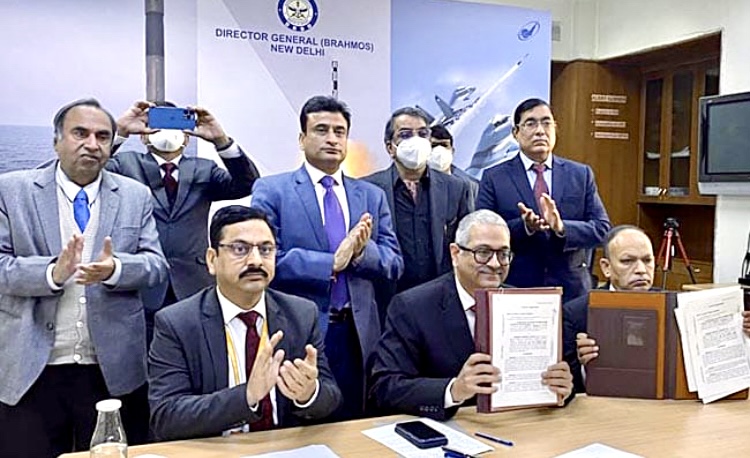In a watershed moment for India's defence export sector, the Philippines is set to receive its first shipment of BrahMos supersonic cruise missiles tomorrow, April 19, 2024. This delivery, part of a deal signed over two years ago, not only represents a significant milestone for India but also underscores its growing prowess as a major defense exporter on the global stage.
According to sources at the Directorate General of Civil Aviation (DGCA), three civilian Freightliners will take-off for Manila later today. Indian Air Force (IAF) sources revealed that an IAF C-17 Globemaster is scheduled to depart today as part of the delivery. This deployment, involving both civilian and military transport assets, highlights the importance of the delivery, and emphasises the strategic intent that goes beyond the deal.

What Does This Development Mean?
The BrahMos missile delivery is more than just a show of the burgeoning prowess of the Indian defence sector. It also shows how strong New Delhi's diplomatic and strategic cooperation is.
To illustrate: the world's fastest supersonic missile, jointly developed by India and Russia, is being delivered to the Philippines in an IAF C-17 military transport aircraft that New Delhi acquired from the United States.
The use of the IAF C-17 as part of the delivery of the first consignment of the BrahMos supersonic cruise missile, symbolically reflects that the strategic support from India is not limited to that from BrahMos Aerospace alone. The Indian Armed Forces can also provide strategic assistance.
What exactly does this mean? Civilian freightliners take time to coordinate. However, an IAF transport aircraft– such as the IAF C-17– can reach Manila in roughly six hours. In case of a scenario where Manila urgently needs logistical assistance, it can be provided swiftly.
The implications of this in maintaining high quality after-sales support, and in times of conflict, are evident.
What is even more important is that the upcoming deliveries will show off to all regional players what India is logistically and militarily capable of, especially when it comes to supporting Manila.
The deterrence value of showcasing that response time and ability cannot be underestimated.
Historic BrahMos Deal and Strategic Implications
In January 2022, the Philippines signed a $374.96 million contract with BrahMos Aerospace Private Limited, marking the first export order of India's indigenously developed missile, which is a joint venture between India's Defence Research and Development Organisation (DRDO) and Russia's NPO Mashinostroyeniya. The deal was inked virtually by Delfin N. Lorenzana, then Defence Secretary of the Philippines, and Atul Dinkar Rane, Director General of BrahMos Aerospace.
This agreement included three missile batteries, operator and maintainer training, and an Integrated Logistics Support (ILS) package. The missile system, primarily for the Philippine Marine Corps' (PMC) Coastal Defense Regiment (CDR), aims to enhance the country's sovereign defense capabilities, particularly in the contentious West Philippines Sea.
Geopolitical Context of BrahMos export
The BrahMos, known for being the world's fastest supersonic cruise missile, provides the Philippines with a critical asset in its ongoing maritime disputes, particularly with China in the West Philippines Sea. Encounters in recent years have seen allegations from Manila of “intimidation and harassment” by Chinese maritime forces. It is one of the many security issues active in the region.
“The BrahMos missiles will significantly boost our naval capabilities, providing a deterrent against threats to our national sovereignty,” Lorenzana stated at the signing ceremony. The missile's operational range was initially capped at 290 km, adhering to the Missile Technology Control Regime (MTCR), but has since been extended following India's entry into the regime.
Strategic and Defensive Leap for the Philippines
The integration of BrahMos missiles signifies a considerable enhancement in the Philippines' military capabilities. It enables rapid and powerful responses to potential threats, thereby reinforcing Manila's stance in its territorial waters. The missile's deployment across the Philippine archipelago will serve as both a strategic deterrent and a quick-reaction force (QRF) to safeguard national interests.
The event also reflects India's strategic diplomatic ties, as the missiles are being transported partly by an American-made military aircraft, the IAF C-17. This detail not only highlights the complex nature of international defence relations but also showcases India's ability to navigate and balance its strategic partnerships.
Robust Growth in Defence Exports
The delivery of BrahMos missiles to the Philippines aligns with India's record achievements in the defense sector, with exports soaring to Rs 21,083 crore (approximately US$ 2.63 billion) in the financial year 2023-24. This figure represents a substantial growth of 32.5% from the previous fiscal year, where exports totaled Rs 15,920 crore.
Remarkably, over the last decade, India's defence exports have expanded by 31 times compared to the figures from FY 2013-14. This trend underscores India's evolving stature as a major global arms supplier and highlights the strategic importance of deals like the BrahMos missile export to the Philippines in bolstering India's defense industry on the international stage.
Looking Forward
As nations around the Indo-Pacific region continue to realign their defence strategies amid rising tensions, the BrahMos missile deal is poised to be a game-changer. It not only cements India's role as a key defense partner but also enhances the Philippines' defensive posture against rising regional threats.
This delivery, therefore, is not just about the transfer of arms, but a testament to the deepening ties between India and the Philippines, poised at the forefront of maintaining stability in a dynamically evolving geopolitical landscape. As these missiles reach Filipino shores, they carry with them implications far beyond their immediate military utility, symbolising a steadfast commitment to sovereignty and regional peace.

Aritra Banerjee is the co-author of the book ‘The Indian Navy At 75: Reminiscing the Voyage' and was the co-founder of Mission Victory India (MVI), a new-age military reforms think-tank. He has worked in TV, Print and Digital media and has been a columnist writing on strategic affairs for national and international publications.



